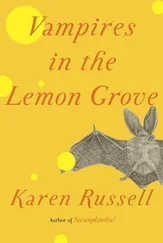“Dad sure loves your singing,” Ruth told me once, her own voice squeaky with jealousy. “He wears that eyedropper everyplace.”
“That’s just faucet water, dummy,” I heard myself lying. “That eyedropper stuff is all an act. Your dad thinks his pregnant cows sing better than I do. Your dad couldn’t pick my voice out of the choir.”
And then Ruth was crying and I felt like a monster. But everybody knows that Mr. Oamaru is not my real father. Mr. Oamaru is my mother’s husband. He is my sisters’ father. Not mine.
Your father left us because he was in a bad way, my mother used to tell me.
Tek’s father left us because he is a bad man, she tells everybody now. She says it again and again. She’s snowing down a new past for Mr. Oamaru, a tough rock of ice in a sea of time. A new memory for our family to stand on. Tek’s father is a bad, bad man. It was hard enough to lose my father the first time. Now I can’t even hold on to my memory of him as a basically good person. Mr. Oamaru has taught me that loss isn’t just limited to the present; it can happen in any direction. Even what’s done and vanished can be taken from you. Other, earlier memories that we made of my father sink and revert to water. The past shifts its crystals inside me.
To be in the Waitiki Valley Boys Choir, you need a good attitude, and the ability to sing in a pleasant, undamaged, unchanged singing voice.
— Franz Josef
On Saturday, Mr. Oamaru drops me off on the tarmac in the purple-gray predawn. We argue about “The Pirates’ Conquest” on the car ride over:
“Honestly! Half that stuff is only in there because it rhymes with conquest.”
Any fool can hear, from the first verse onward, how Waitiki’s history has been retrofitted to the demands of rhyme and meter.
“Bronze breast, ice chest, crow’s nest, laid to rest, Captain Walley’s scarlet vest. Do you really think that Captain Walley wore a vest ?”
“That song’s truer than you are. Why, we’ve been singing it for longer than you’ve been alive! It’s history…. ”
It’s freezing out. A wreath of icicles forms on the dash. We reach a short airstrip where a bunch of sullen, sleepy choirboys are huddled together, flanked by a small fleet of ice planes. The choir director nods at me and checks a box. Franz Josef has a thick, twitchy mustache and no wife. There’s no magic to his conducting. He waves the metal wand with a grim, efficient panic, as if he’s directing traffic. I miss my cue again.
“Tek Oamaru! You’re a beat behind us. Chin up, eh? Enunciate, eh? You’re singing down into your chest.”
Just Tek, I whisper under my breath. I hate rehearsing this evil stuff. It makes me feel like “The Pirates’ Conquest” is still happening. Usually I just lip sync the part about the rapes and fires. If I were braver, I wouldn’t sing at all. I have a secret admiration for Rangi, his genius refusal to carry the tune.
Rangi’s been in the choir longer than any other boy. If his voice has changed, it’s done so in secret, with the stealth of wine in a dark bottle. If you ask me, it’s a perverse charity to make the mute boy rehearse with the choir. But Franz Josef says there is music like water frozen inside him. He says he wants the Waitiki Valley Boys Choir to be the heat that melts the blocks of song in Rangi. We think that Franz Josef has fantasies of a TV special, or at least a write-up in the Waitiki Gazette:
Local Choir Director Hailed as Miracle Worker! Mute Moa Youth Has the Music in Him!
“Sing it with us, Rangi!” Franz Josef says now. He kneels down and pushes his gloved hand into Rangi’s diaphragm, as if he is a doctor fighting for the life of an infant sound. “Me-me-me-ME-me-me-me!”
Rangi looks as if he might bite Franz Josef.
Rangi’s a Moa orphan. His adopted father, Digger Gibson, is the cemetery warden. Digger never comes to our concerts. Most days he spends dreaming in the ditches. White face, gray knuckles around a bottle. On his chest you can watch the shovel rising, the shovel falling, a graveyard metronome.
We know that Rangi can at least mutter because Digger Gibson says he used to talk to the bear. In his group home for orphaned Moa boys, Rangi had a pet cinnamon bear. I saw her once. She was just a wet-nosed cub, a cuff of pure white around her neck. Rangi found her on the banks of the Waitiki River and walked her around on a leash. He filed her claws and fed her tiny, smelly fishes. They shot her the day his new father, Digger, came to pick him up.
“Burying that bear,” I overheard Digger tell Mr. Oamaru once. “The first thing we ever did together as father and son.”
Rangi’s given us this global silent treatment ever since, a silence he extends to people, animals, ice. Doctors say it’s an elective mutism; they can’t detect trauma, can’t find a gauze of sickness on his tongue. Rangi has tried to run away from our choir four times now, although he never gets very far — the Valley is walled in on every side by glacial mountains. We think he’s on an insane quest to unearth the bear. He always gets “rescued” at some anonymous spot in the forest, spading up dark triangles of dirt. There are no physical markers to help him to locate the burial mound, no clues to the bear’s whereabouts outside of Rangi’s childhood memory. Digger never put down a stone. Rangi could dig forever and find only yellow bromide and shallow roots. Stubborn, the grandfathers say. Ungrateful. Typical Moa. This diagnosis has always troubled me. Sometimes Rangi’s gaze darkens and rolls inward, and then I think he must be seeing something that nobody’s invented the words for yet. A slick world that no sound will adhere to.
“Me-me-me-ME-me-me-me!” Franz Josef keeps prompting. His hand pushes down with more encouragement. “Me-me-me-omph!”
Franz Josef’s head snaps forward. His wire spectacles and conductor’s wand go flying. There’s a moment of shocked silence, and then the clearing erupts with laughter. Brauser has nailed Franz Josef in the back of the head with a mammoth snowball. Brauser’s a sociopath with a pleasant tenor. He spends most rehearsals around back, torturing stray penguins or pissing his name in the snow. Now he’s smirking at us from the treeline, scooping up more powder. It’s unclear whether Brauser was trying to hit Franz Josef or Rangi. I hope it was the former. That’s one difference between a bully and a hero, I guess: good aim. If Brauser was trying to hit Franz to help Rangi, then maybe there’s more to his malice than I thought.
Then Brauser starts pelting the altos with indiscriminate glee, making my hero theory less tenable. They cry out in terror. Franz calls a stern halt to our rehearsal. He searches the snow for his wand.
Rangi, meanwhile, has wandered away from the choir. He is sitting on a low fence at the edge of the airstrip and staring off into the trees. I take one step towards him, then another. Be that friend becomes the wind pushing me forward.
“Hey Rangi? Listen, I’m sorry for…you know, I have this stepfather, too….” I trail off. Rangi turns and stares at me with a mirror’s flat assessment, merciless and impersonal. I can see how stupid I must look to him. “I just wanted to say that I’m sorry.” I shrug. Then some secret life flames in Rangi’s eyes and for an instant I feel an identical ache quivering between us. It’s over so quickly that I wonder if I imagined it. Rangi goes back to studying invisible symmetries in the snow. I jog through the light flurries, hoping that Brauser and the others didn’t see me back here.
A few minutes later, the planes begin to roll forward, the white egg of the sun reflected in their dark windows. On the glacier, the sun is so violently bright that, without special lenses, ice pilots can burn through their corneas within half an hour. Today there are four pilots on the tarmac, all with matching ski suits and identical lavender eyes. Each ice pilot walks around and whumps the red belly of his fuselage. They introduce themselves: Steve and Steve and Steve and Hone Te Kauriki-himi. “Call me Steve,” Hone says, with a bitter curl to his lips, and we all laugh with relief. Hone’s eyes are lavender, too, but you can see their true tea color behind the contacts.
Читать дальше












